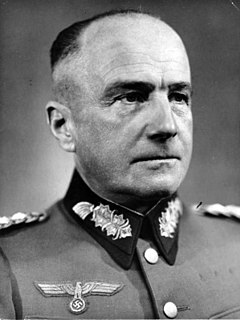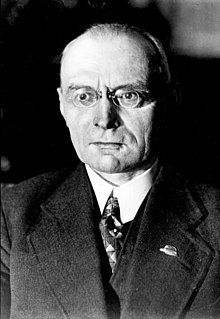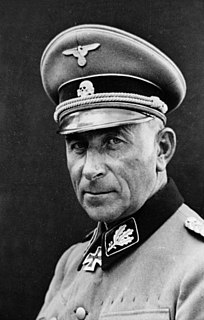 W
WWilhelm Adam was a German general who served in the Bavarian Army, the Reichswehr and the Wehrmacht.
 W
WLudwig August Theodor Beck was a German general and Chief of the German General Staff during the early years of the Nazi regime in Germany before World War II. Although Beck never became a member of the Nazi Party, in the early 1930s he supported Adolf Hitler's forceful denunciation of the Versailles Treaty and belief in the need for Germany to rearm. Beck had grave misgivings regarding the Nazi demand for all German officers to swear an oath of fealty to the person of Hitler in 1934, but Beck believed that Germany needed strong government, which Hitler could successfully provide if the Führer was influenced by traditional elements within the military, rather than by the SA and SS.
 W
WKarl Heinrich Emil Becker was a German weapons engineer and artillery general. He advocated and implemented close ties of the military to science for purposes of advanced weapons development. He was the head of the Army Ordnance Office, Senator of the Kaiser Wilhelm Society, first president of the Reich Research Council, the first general officer to be a member of the Prussian Academy of Sciences, as well as being a professor at both the University of Berlin and the Berlin Technical University. He was an early and key supporter of the development of ballistic rockets as weapons. The military-scientific infrastructure he helped implement supported the German nuclear energy program, known as the Uranium Club. Being depressed over heavy criticism from Hitler for shortfalls in munitions production, he committed suicide in 1940. He was given a State funeral.
 W
WJohannes Albrecht Blaskowitz was a German general during World War II and recipient of the Knight's Cross of the Iron Cross with Oak Leaves and Swords.
 W
WWalther Heinrich Alfred Hermann von Brauchitsch was a German field marshal and the Commander-in-Chief (Oberbefehlshaber) of the German Army during World War II. Born into an aristocratic military family, he entered army service in 1901. During World War I, he served with distinction on the corps-level and division-level staff on the Western Front.
 W
WJakob Ritter von Danner was a Bavarian general in the Imperial German Army and the Reichswehr. As commandant of the Munich garrison of the Reichswehr, he was a central figure in putting down the attempted Beer Hall Putsch by Adolf Hitler and the Nazis in 1923.
 W
WFriedrich Karl Albert Dollmann was a German general during World War II who commanded the 7th Army during the Invasion of France and the early phases of the Allied invasion of Normandy until his death in June 1944.
 W
WTheodor Endres was a German general during World War II. He was a recipient of the Knight's Cross of the Iron Cross of Nazi Germany. Endres retired from active service on 31 January 1943.
 W
WFranz Ritter von Epp, born Franz Epp, from 1918 Ritter von Epp, was a German general and politician who started his military career in the Bavarian Army. Successful wartime military service earned him a knighthood in 1916. After the end of World War I and the dissolution of the German Empire, von Epp was a commanding officer in the Freikorps and the Reichswehr. He was a member of Bavarian People's Party, before joining the Nazi Party in 1928, when he was elected as a member of the German parliament or Reichstag, a position he held until the fall of Nazi Germany. He was the Reichskommissar, later Reichsstatthalter, for Bavaria, and a Reichsleiter of the Nazi Party.
 W
WWaldemar Erfurth was a German general of infantry.
 W
WLudwig von Estorff was a German general during World War I.
 W
WAlexander Ernst Alfred Hermann Freiherr von Falkenhausen was a German general and military advisor to Chiang Kai-shek. He was an important figure during the Sino-German cooperation to reform the Chinese Army. In 1938, Germany ended its support for China under pressure from Japan, and Falkenhausen was forced to return home. Back in Europe, he later became the head of the military government of Belgium from 1940 to 1944 during its German occupation.
 W
WHans Feige was a German General of the Infantry in the Wehrmacht during World War II.
 W
WHermann Geyer was a German general during World War II who commanded the IX Army Corps. He was a recipient of the Knight's Cross of the Iron Cross of Nazi Germany. Geyer retired in 1943 and committed suicide in 1946.
 W
WPaul Hausser was a German general and then a high-ranking commander in the Waffen-SS who played a key role in the post-war efforts by former members of the Waffen-SS to achieve historical and legal rehabilitation.
 W
WWalter Heitz was a German general (Generaloberst) in the Wehrmacht during World War II who served as President of the Reich Military Court and commanded part of the 6th Army in the Battle of Stalingrad.
 W
WKarl Höfer was a German general. During World War I he became known as the Held vom Kemmelberge (hero of Kemmel hill) after his division had captured the Kemmelberg during the Fourth Battle of Flanders.
 W
WBernhard Franz Karl Adolf von Hülsen was a German general.
 W
WLeonhard Kaupisch was a German general during World War II who served as Supreme Military Commander of occupied Denmark.
 W
WPaul Ludwig Ewald von Kleist was a German field marshal during World War II. Kleist was the commander of Panzer Group Kleist, the first operational formation of several Panzer corps in the Wehrmacht during the Battle of France, the Battle of Belgium, the Invasion of Yugoslavia and Operation Barbarossa, the invasion of the Soviet Union.
 W
WGünther Adolf Ferdinand von Kluge, also known as Hans Günther von Kluge, was a German field marshal during World War II who held commands on both the Eastern and Western Fronts. He commanded the 4th Army of the Wehrmacht during the invasion of Poland in 1939 and the Battle of France in 1940, earning a promotion to Generalfeldmarschall. Kluge went on to command the 4th Army in Operation Barbarossa and the Battle for Moscow in 1941.
 W
WPaul Emil von Lettow-Vorbeck, also called the Lion of Africa, was a general in the Imperial German Army and the commander of its forces in the German East Africa campaign. For four years, with a force of about 14,000, he held in check a much larger force of 300,000 British, Indian, Belgian, and Portuguese troops.
 W
WWilhelm List was a German field marshal during World War II who was convicted of war crimes by a US Army tribunal after the war. List commanded the 14th Army in the invasion of Poland and the 12th Army in the invasions of France, Yugoslavia and Greece. In 1941 he commanded the German forces in Southeast Europe responsible for the occupation of Greece and Yugoslavia. In July 1942 during Case Blue, the German summer offensive in Southern Russia, he was appointed commander of Army Group A, responsible for the main thrust towards the Caucasus and Baku.
 W
WOtto Hermann von Lossow was a Bavarian Army and then German Army officer who played a prominent role in the events surrounding the attempted Beer Hall Putsch by Adolf Hitler and the Nazi Party in November 1923.
 W
WKarl von Roques was a German general and war criminal during the Second World War, who commanded the Army Group Rear Area behind Army Group South. Following the war, Roques was sentenced to 20 years imprisonment in the High Command Trial. He died in 1949 while serving his sentence.
 W
WOtto von Stülpnagel was a German military commander of occupied France during the Second World War. Arrested by Allied authorities after the war, he committed suicide in prison in 1948.
 W
WOskar Walther Gerhard Julius Freiherr von Watter was a German Generalleutnant, and came from an old Pomeranian noble family.
 W
WJob Wilhelm Georg Erdmann Erwin von Witzleben was a German field marshal in the Wehrmacht during the Second World War. A leading conspirator in the 20 July plot to assassinate Adolf Hitler, he was designated to become Commander-in-Chief of the Wehrmacht in a post-Nazi regime had the plot succeeded.